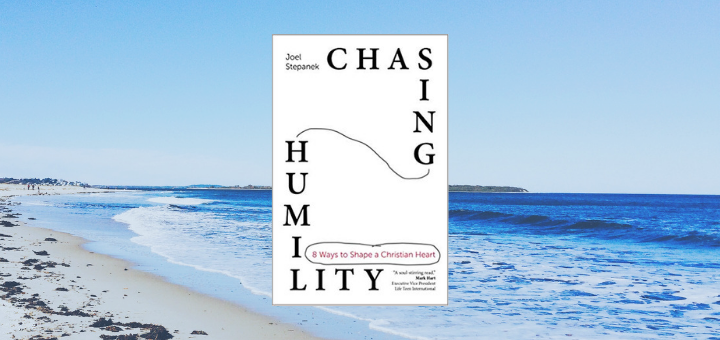
 Image created by the author in Canva.[/caption]
Do you want to be humble? If we’re being honest, many of us would say “No” to that question. Others of us might pay it lip service, but deep down feel uncomfortable with the idea. Humility seems to be so in conflict with all the things that our modern society holds dear. How could anyone living in our modern world actually strive for humility? The answer is that if we are seeking holiness, humility is a big part of that equation.
As someone who confesses to pride every single time I go to confession, humility is something I clearly need. This is why I eagerly starting reading Chasing Humility: 8 Ways to Shape a Christian Heart by Joel Stepanek (Ave Maria Press) as soon as it arrived in my mailbox.
Image created by the author in Canva.[/caption]
Do you want to be humble? If we’re being honest, many of us would say “No” to that question. Others of us might pay it lip service, but deep down feel uncomfortable with the idea. Humility seems to be so in conflict with all the things that our modern society holds dear. How could anyone living in our modern world actually strive for humility? The answer is that if we are seeking holiness, humility is a big part of that equation.
As someone who confesses to pride every single time I go to confession, humility is something I clearly need. This is why I eagerly starting reading Chasing Humility: 8 Ways to Shape a Christian Heart by Joel Stepanek (Ave Maria Press) as soon as it arrived in my mailbox.
 Stepanek uses the Litany of Humility as the basis of the book:
Stepanek uses the Litany of Humility as the basis of the book:
Lord Jesus. Meek and humble of heart, Hear me. From the desire of being esteemed, Deliver me, Jesus. From the desire of being loved, Deliver me, Jesus. From the desire of being extolled, Deliver me, Jesus. From the desire of being honored, Deliver me, Jesus. From the desire of being praised, Deliver me, Jesus. From the desire of being preferred to others, Deliver me, Jesus. From the desire of being consulted, Deliver me, Jesus. From the desire of being approved, Deliver me, Jesus. From the fear of being humiliated, Deliver me, Jesus. From the fear of being despised, Deliver me, Jesus. From the fear of suffering rebukes, Deliver me, Jesus. From the fear of being calumniated, Deliver me, Jesus. From the fear of being forgotten, Deliver me, Jesus. From the fear of being ridiculed, Deliver me, Jesus. From the fear of being wronged, Deliver me, Jesus. From the fear of being suspected, Deliver me, Jesus. That others may be loved more than I, Jesus, grant me the grace to desire it. That others may be esteemed more than I, Jesus, grant me the grace to desire it. That, in the opinion of the world, others may increase and I may decrease, Jesus, grant me the grace to desire it. That others may be chosen and I set aside, Jesus, grant me the grace to desire it. That others may be praised and I unnoticed, Jesus, grant me the grace to desire it. That others may be preferred to me in everything, Jesus, grant me the grace to desire it. That others may become holier than I, provided that I may become as holy as I should, Jesus, grant me the grace to desire it.Simply reading through, one realizes just how difficult it is to pray this prayer and mean it. Stepanek acknowledges that it took him quite a while to come to terms with understanding and desiring humility. He had a false view of humility, thinking that “you were either successful in the eyes of the world or you were humble and destitute but you got to be a disciple of Jesus.” In time, he came to realize that G.K. Chesterton’s definition is much more accurate: “Humility is not thinking less of yourself, but thinking of yourself less.” In fact, the only way to be truly successful is to embrace humility. Stepanek divides the petitions in the Litany of Humility into eight main themes: being authentic, growing confidence, being grateful for today, loving others, giving praise, empowering those around me, becoming the mentor, and breaking boundaries. He explores each of these themes, offering concrete ways to work on each area. He also shares anecdotes from his own life to illustrate that he is right there with us, struggling to develop humility. Like most things on our spiritual journey, cultivating humility is a life-long process. As an interesting side note, the author of the Litany of Humility is unknown. His prayer for humility was answered. God will answer our prayers for humility as well, if only we are brave enough to trust in God and pray for it. Chasing Humility offers so much food for thought. This is a hard topic and one many will reject without a passing glance, but if you are serious about becoming closer to God, this is one book you will want to pick up.
Visit our Book Notes archive.
Copyright 2019 Patrice Fagnant-MacArthur This article contains Amazon affiliate links; your purchases through these links benefit the author.
About the Author

Patrice Fagnant-MacArthur
Patrice Fagnant-MacArthur has a master’s degree in applied theology and is the author of The Power of Forgiveness, Our Lady of La Salette: A Mother Weeps for Her Children, and The Life and Lessons of St. Zelie Martin. A mother of three, she is the editor of TodaysCatholicHomeschooling.com as well as a freelance writer and editor.


.png?width=1806&height=731&name=CatholicMom_hcfm_logo1_pos_871c_2728c%20(002).png)
Comments